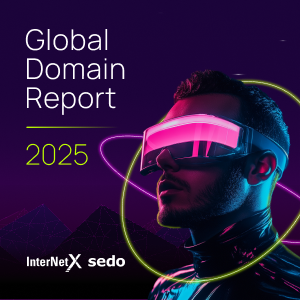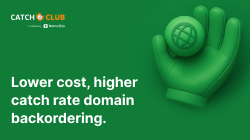- Joined
- Oct 12, 2023
- Posts
- 125
- Reaction score
- 47
Welcome to our monthly Industry News Digest. Explore new online trends and domain industry news to stay up-to-date. Here’s a summary for April 2025.
Afternic, the domain marketplace, has released its rankings for the most sought-after keywords in January and February.
The keyword ‘ai’ maintains its lead, securing the top spot in both lists. ‘My’, ‘bet’, and ‘group’ also retained their positions. Overall, IT-related terms continued to be in high demand, consistently appearing in the top-20 for the first two months of 2025.
In January, the term ‘agent’ surged into the top 10, reflecting its dual relevance to AI-driven tools (eg, ‘AI agents’). Alongside ‘agent’, IT-related keywords like ‘ai’, ‘it’, ‘solutions’, and ‘tech’ are on the list, signaling strong demand for niche fields in the tech sector.
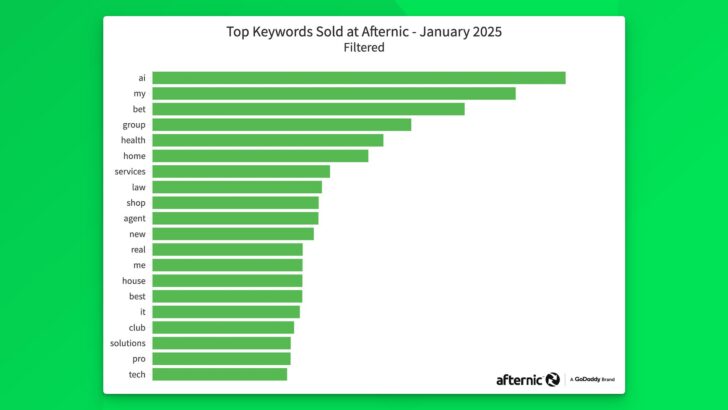
The Afternic keyword list. Source: Domain Name Wire
However, in February the situation changed a little. ‘Agent’ lost its place in the rankings and, along with ‘health’, ‘services’, ‘new’, ‘me’, ‘it’, ‘club’, and ‘solutions’, dropped out of the top 20. Nevertheless, the list still had enough IT-related keywords with ‘ai’ at the top of the rating.
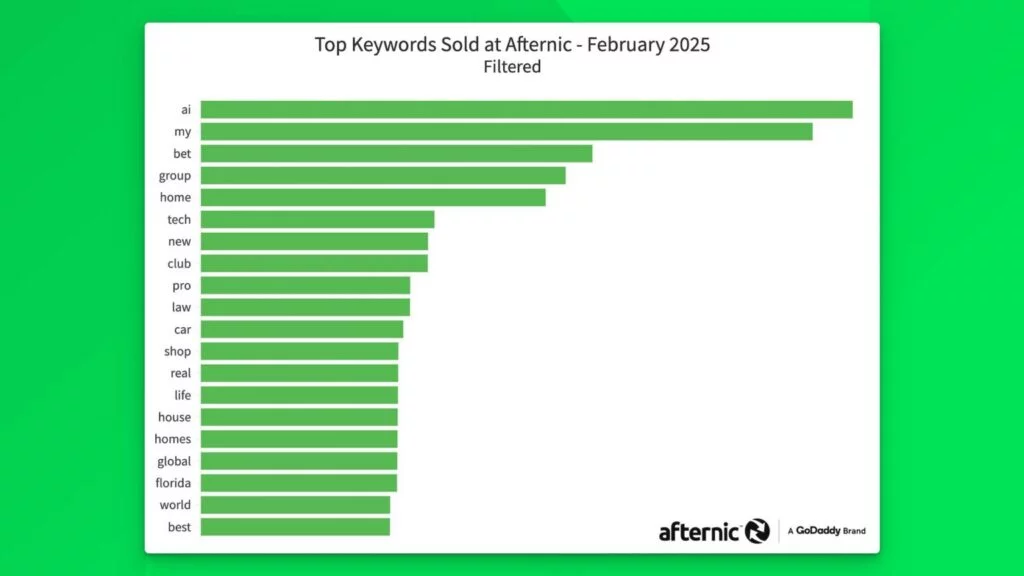
The Afternic keyword list. Source: Domain Name Wire
Why should you care? Companies can use keyword-heavy domains (eg, solutions.it.com) to boost SEO and brand awareness. Ignoring these trends may mean missing out on opportunities in high-growth sectors like AI and IT.
Source: Domain Name Wire
Google is gradually consolidating domains like google.fr, google.ca, and google.co.jp to google.com. Essentially, the ‘google’ domain in different ccTLDs (country-code top–level domains) will disappear, leaving only one domain for Google search engines worldwide.
This move began in 2017, when the company started delivering localized results, regardless of the domain. The goal is to streamline the search engine structure and enhance its functionality.
Google assured users that these updates won’t alter the search experience or affect compliance with national laws. However, URLs in browsers will change, which might impact websites’ analytics.
Gary Illyes, a Google specialist, hinted at a shift away from reliance on hreflang tags (special HTML attributes that indicate the language and regional affiliation of a web page) in favor of automatic language detection. Yet John Mueller, a Senior Webmaster Trends Analyst and Search Relations team lead, clarified that international SEO remains unchanged, so this wouldn’t be a universal recommendation for all sites.
The Search Engine Journal offers several SEO tips for professionals:
This change is part of Google’s business strategy, but doesn’t affect the core practices of international SEO. Specialists must adapt to new conditions while maintaining proven methods.
Why should you care? Google hasn’t announced changes to its international content or hreflang signals despite industry debate on automatic language detection. However, the company advises monitoring how these changes affect your visibility in international searches and traffic, but remember that the basic methods of international SEO remain unchanged for now.
Source: Search Engine Journal
NordStellar, a cybersecurity risk management platform for businesses developed by the cybersecurity firm Nord Security, has introduced a paid service to combat cybersquatting; the registration of domain names maliciously similar to existing sites to poach traffic. This innovative tool employs artificial intelligence to identify potentially harmful domains before they can wreak havoc. Anyone interested can order a demo version of the tool on the NordStellar website.
The challenge when detecting fake domains lies in their near-identical appearance to legitimate websites. Consider the subtle difference between yourcompany.it.com and yourconpany.it.com. The simple switch from ‘m’ to ‘n’ can go unnoticed, especially when font and size are involved. NordStellar’s service vigilantly scans for domains that closely mimic well-known brands, thereby thwarting cybersquatting and fraud.
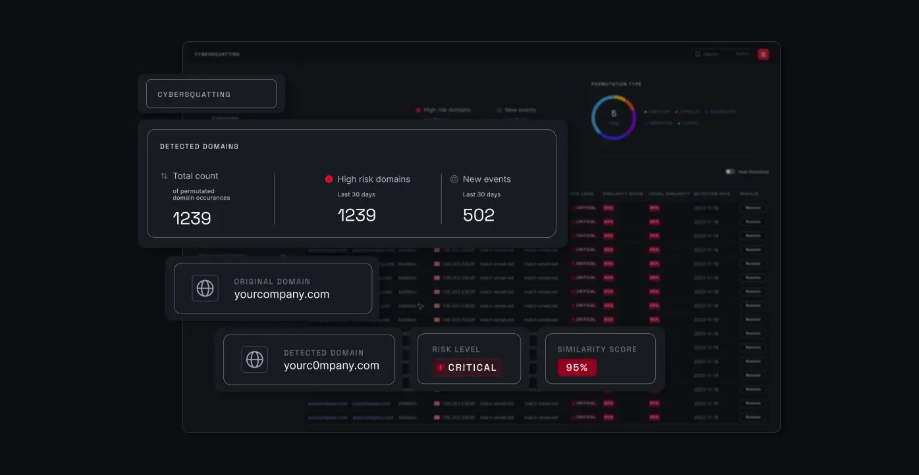
Source: NordStellar blog
Moreover, the system continuously monitors the registration of such domains in real-time, issuing timely alerts. This proactive approach empowers organizations to swiftly investigate and verify these potentially malicious domains, ensuring their digital assets remain secure.
Why should you care? Brands that neglect domain monitoring risk reputational damage and financial loss from counterfeit sites. For startups, it’s better to register domain variations early to block cybersquatters. Proactive measures like NordStellar’s tool are critical in an era of escalating cyber threats.
Source: NordStellar blog
Recently, the UK’s Online Safety Act (OSA), enacted at the end of 2023, has finally come into effect. This legislation aims to combat illegal and harmful content. Ofcom, the government-appointed regulatory body for broadcasting, the Internet, telecommunications and postal services in the UK, serves as the content regulator for this purpose.
The OSA grants Ofcom the authority to demand changes to online platforms’ algorithms when dangerous content is distributed. If violations occur, the organization can impose hefty fines or block the resources. This regulation applies worldwide, as platforms with a UK audience must adhere to Ofcom’s guidelines.
Recently, Ofcom initiated an inquiry into a prominent forum hosted by Cloudflare that discussed methods for causing irreversible self-harm.
The forum is likely to be blocked, though it might shift to a different domain. While Ofcom’s primary focus has been on social media and online platforms, domain registrars like GoDaddy are also adapting to comply with the OSA.
Why should you care? OSA regulates content published on the Internet, protecting users from hackers, among other things. All domain owners are best advised to double-check the content they post on their sites. Also, if you own parked domains that host ads or third-party content, ensure they comply with OSA to avoid penalties.
Source: Ofcom blog
Stay up-to-date with digital trends and news – visit it.com Domains blog and follow us on social media.
Continue reading at the it.com Domains blog...
IT-related Keywords Are in the Top 20 of Afternic’s Reports
Afternic, the domain marketplace, has released its rankings for the most sought-after keywords in January and February.
The keyword ‘ai’ maintains its lead, securing the top spot in both lists. ‘My’, ‘bet’, and ‘group’ also retained their positions. Overall, IT-related terms continued to be in high demand, consistently appearing in the top-20 for the first two months of 2025.
In January, the term ‘agent’ surged into the top 10, reflecting its dual relevance to AI-driven tools (eg, ‘AI agents’). Alongside ‘agent’, IT-related keywords like ‘ai’, ‘it’, ‘solutions’, and ‘tech’ are on the list, signaling strong demand for niche fields in the tech sector.

The Afternic keyword list. Source: Domain Name Wire
However, in February the situation changed a little. ‘Agent’ lost its place in the rankings and, along with ‘health’, ‘services’, ‘new’, ‘me’, ‘it’, ‘club’, and ‘solutions’, dropped out of the top 20. Nevertheless, the list still had enough IT-related keywords with ‘ai’ at the top of the rating.

The Afternic keyword list. Source: Domain Name Wire
Why should you care? Companies can use keyword-heavy domains (eg, solutions.it.com) to boost SEO and brand awareness. Ignoring these trends may mean missing out on opportunities in high-growth sectors like AI and IT.
Source: Domain Name Wire
Google Redirect Country Domains to Google.com
Google is gradually consolidating domains like google.fr, google.ca, and google.co.jp to google.com. Essentially, the ‘google’ domain in different ccTLDs (country-code top–level domains) will disappear, leaving only one domain for Google search engines worldwide.
This move began in 2017, when the company started delivering localized results, regardless of the domain. The goal is to streamline the search engine structure and enhance its functionality.
Google assured users that these updates won’t alter the search experience or affect compliance with national laws. However, URLs in browsers will change, which might impact websites’ analytics.
Gary Illyes, a Google specialist, hinted at a shift away from reliance on hreflang tags (special HTML attributes that indicate the language and regional affiliation of a web page) in favor of automatic language detection. Yet John Mueller, a Senior Webmaster Trends Analyst and Search Relations team lead, clarified that international SEO remains unchanged, so this wouldn’t be a universal recommendation for all sites.
The Search Engine Journal offers several SEO tips for professionals:
- Continue to use hreflang tags.
- Clearly define language and regional targeting.
- Monitor changes in traffic patterns.
- Review strategies based on national domains.
This change is part of Google’s business strategy, but doesn’t affect the core practices of international SEO. Specialists must adapt to new conditions while maintaining proven methods.
Why should you care? Google hasn’t announced changes to its international content or hreflang signals despite industry debate on automatic language detection. However, the company advises monitoring how these changes affect your visibility in international searches and traffic, but remember that the basic methods of international SEO remain unchanged for now.
Source: Search Engine Journal
New AI Tool Combats Fraudulent Domains
NordStellar, a cybersecurity risk management platform for businesses developed by the cybersecurity firm Nord Security, has introduced a paid service to combat cybersquatting; the registration of domain names maliciously similar to existing sites to poach traffic. This innovative tool employs artificial intelligence to identify potentially harmful domains before they can wreak havoc. Anyone interested can order a demo version of the tool on the NordStellar website.
The challenge when detecting fake domains lies in their near-identical appearance to legitimate websites. Consider the subtle difference between yourcompany.it.com and yourconpany.it.com. The simple switch from ‘m’ to ‘n’ can go unnoticed, especially when font and size are involved. NordStellar’s service vigilantly scans for domains that closely mimic well-known brands, thereby thwarting cybersquatting and fraud.

Source: NordStellar blog
Moreover, the system continuously monitors the registration of such domains in real-time, issuing timely alerts. This proactive approach empowers organizations to swiftly investigate and verify these potentially malicious domains, ensuring their digital assets remain secure.
Why should you care? Brands that neglect domain monitoring risk reputational damage and financial loss from counterfeit sites. For startups, it’s better to register domain variations early to block cybersquatters. Proactive measures like NordStellar’s tool are critical in an era of escalating cyber threats.
Source: NordStellar blog
UK’s Online Safety Act Takes Aim at Harmful Content
Recently, the UK’s Online Safety Act (OSA), enacted at the end of 2023, has finally come into effect. This legislation aims to combat illegal and harmful content. Ofcom, the government-appointed regulatory body for broadcasting, the Internet, telecommunications and postal services in the UK, serves as the content regulator for this purpose.
The OSA grants Ofcom the authority to demand changes to online platforms’ algorithms when dangerous content is distributed. If violations occur, the organization can impose hefty fines or block the resources. This regulation applies worldwide, as platforms with a UK audience must adhere to Ofcom’s guidelines.
Recently, Ofcom initiated an inquiry into a prominent forum hosted by Cloudflare that discussed methods for causing irreversible self-harm.
The forum is likely to be blocked, though it might shift to a different domain. While Ofcom’s primary focus has been on social media and online platforms, domain registrars like GoDaddy are also adapting to comply with the OSA.
Why should you care? OSA regulates content published on the Internet, protecting users from hackers, among other things. All domain owners are best advised to double-check the content they post on their sites. Also, if you own parked domains that host ads or third-party content, ensure they comply with OSA to avoid penalties.
Source: Ofcom blog
Stay up-to-date with digital trends and news – visit it.com Domains blog and follow us on social media.
Continue reading at the it.com Domains blog...




